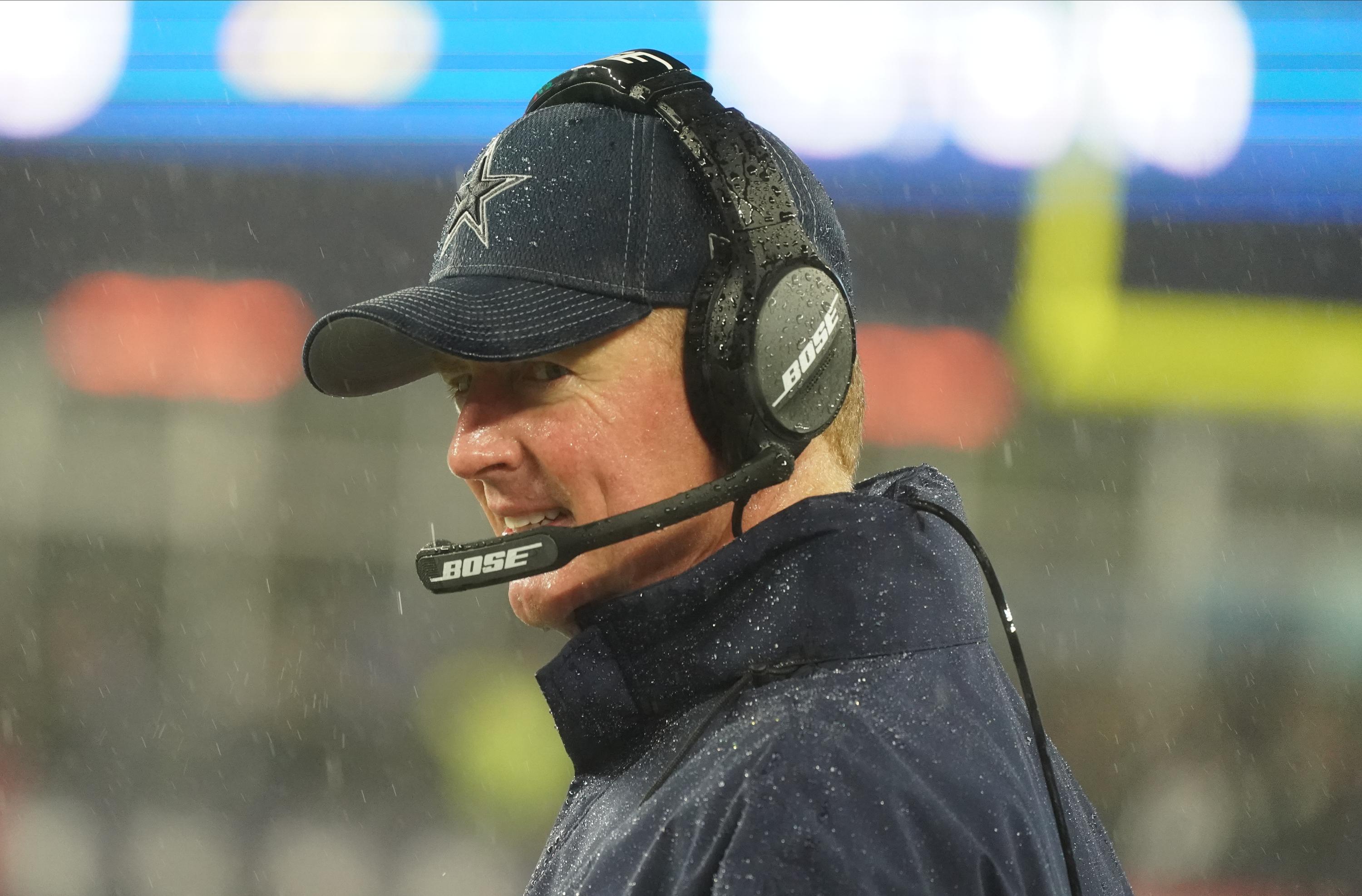
Patriots fans sat in the rain for three hours in Foxborough, Massachusetts, on Sunday, but Cowboys fans are the ones that got hosed. New England’s and Dallas’s defenses dominated in a cold, wet matchup that had a playoff-like atmosphere. However, like last year’s NFC championship game, an excellent contest was overshadowed by the referees. The Patriots outplayed Dallas in a 13-9 win, and the Cowboys’ mental errors ultimately cost them, but Sunday’s game is the latest example of a potentially thrilling finish being upended by inexplicable officiating.
The call in question happened when the Cowboys were down 13-9 with two minutes left and facing a third-and-1 at their own 35-yard line. Quarterback Dak Prescott found running back Ezekiel Elliott for 3 yards and a first down, but then a flag came in. Tripping on Cowboys center Travis Frederick. The call was dubious at best. As FOX showed more replays, announcer Troy Aikman became increasingly dumbfounded by the call. There is little contact between Frederick and Pats linebacker Dont’a Hightower on the play, and it looks like routine blocking.
It was the second tripping penalty of the game despite just seven such penalties being called in the first 11 weeks of the season leaguewide. Cowboys linebacker Jaylon Smith made his thoughts clear after the game.
The penalty required Dallas to replay the down, but instead of third-and-1, they faced a third-and-11. On that play, Prescott quickly faced pressure and threw the ball away. On fourth down, he found wide receiver Amari Cooper for a long gain, but the catch was overturned on replay, handing the ball back to the Patriots. The Cowboys got the ball back with one second left and ran a failed attempt at a hook and ladder, but for all intents and purposes, the game was lost on the previous drive, which wasn’t ended by New England’s defense, but by the referees adding 10 yards on third down with a phantom call that is rarely made, nevermind in pivotal moments.
It’s still a leap to assume that the Cowboys would have scored a touchdown on that drive had the tripping call on Frederick not been called. New England’s defense suffocated the Cowboys offense, and the weather aided the Patriots’ game plan to limit Prescott’s passing. There was so much rain that midway through the game, Prescott put a glove on his throwing hand for the first time in his career. He completed just 19-of-33 passes for 212 yards, no touchdowns, and one interception. The Cowboys converted just two of 13 third downs on the day, improving New England’s league-leading rate. Star receiver Amari Cooper was held without a catch. Even so, the Patriots defense did not sack Prescott once despite blitzing him a healthy amount, and he looked dangerous on the final drive until the tripping penalty pushed the Cowboys back.
Dallas fans have every right to feel aggrieved by the officiating, but the Cowboys were in need of a come-from-behind drive largely because of their own mistakes. Head coach Jason Garrett’s decided to kick a field goal instead of giving Prescott a chance to convert a fourth-and-7 at the New England 11-yard line with just over six minutes remaining and Dallas trailing 13-6. It’s understandable if Garrett was dubious of his team’s chances to convert—the Patriots are the best team in the league on third-down conversions, and Dallas could barely convert third-and-short, nevermind fourth-and-long. What’s confounding is that a field goal didn’t help much. Dallas was down seven points, so it still would still need a touchdown on its next drive even after kicking a field goal. When the Cowboys got the ball back, they had no choice but to attempt to convert a fourth-and-11, 4 yards longer than the fourth-and-7 they passed up earlier. The field goal protected the Cowboy’s comeback chances in case the Patriots kicked a field goal on their ensuing drive, but the move reeks of delaying losing rather than playing to win.
Win probability charts are not everyone’s cup of tea, and for those who don’t want to look at graphs when talking about football, there were much more obvious mistakes that cost the Cowboys points on Sunday. They gifted New England its first 10 points. In the first quarter, Patriots special teams legend Matthew Slater blocked a Chris Jones punt that gave New England the ball just 12 yards from the end zone.
Two plays later, Tom Brady threw his 15th touchdown of the season to rookie receiver N’Keal Harry to give the Patriots a 7-0 lead. (Brady set two records on the score: Harry is the 75th different player he’s thrown a touchdown to, extending his own record. Brady also set the record for most touchdowns after turning 42.) Cowboys kickoff returner Tony Pollard muffed the ensuing kickoff but recovered his own fumble. On Dallas’s first play of that drive, tight end Blake Jarwin fumbled but also recovered. Two plays later, Prescott barely corralled a scattershot shotgun snap, and when he returned his eyes downfield, he rifled a pass to Cooper that was intercepted by cornerback Stephon Gilmore.
New England’s first two scoring drives came directly from Cowboys mistakes and spanned just 15 yards across six plays, but it was enough to sink Dallas.
Gifting points to the Patriots was not Dallas’s only mistake. Offensive lineman Tyron Smith killed two drives with a holding and a false start penalty. Bill Belichick’s punt block unit confused Dallas’s punt team so thoroughly the Cowboys took back-to-back penalties on one punt and handed the Patriots roughly 20 yards of field position.
Conservative coaching and special teams mistakes are endemic to the Jason Garrett era in Dallas. Losing the game this way is representative of issues that have plagued the team for much of his tenure, not a sign they got unlucky against the Patriots. At least one person is getting tired of it. Cowboys owner Jerry Jones told reporters that “every aspect of special teams has been problematic for us,” and that the reason was “100 percent coaching.” He also told reporters that “with the makeup of this team, I shouldn’t be this frustrated.”
Dallas is 6-5 and sits in first place in the NFC East—barely ahead of the flailing Philadelphia Eagles. The Cowboys have yet to beat a likely playoff team this season but have lost to the Saints, Packers, Vikings, and Patriots.
Dallas made so many mistakes that it’s hard to feel sympathetic, but the tripping penalty at the end of the game is the latest example of referees wantonly inserting themselves at crucial moments and affecting the outcome of games. It’s frustrating for Cowboys fans, who had a chance to get their first win against an opponent above .500, and to do it in Foxborough, where New England has not lost since October 2017. It’s frustrating for everyone, except maybe Patriots fans. Yet it keeps happening, and it highlights the league’s need for a mechanism to look at egregious missed calls at the end of games. Garrett understands this. He became a key ally of Sean Payton’s as the Saints coach lobbied the league to make pass interference reviewable after New Orleans’s loss to the Rams in the NFC championship game. At the NFL owners meetings in March, Garrett made an emotional speech that reportedly swayed owners’ opinions before the competition committee voted to institute a rule change.
“What resonated with me after the two championship games was this,” Garrett told NBC’s Peter King in April. “The four teams playing at the end of January, the best teams in our game, play overtime games. Fantastic football games. And what is America talking about? Officiating. The two best teams in the NFC play this unbelievable game. Great coaches, great players. A Hall of Fame quarterback in Drew Brees, and so no one is even talking about the game and all of those elements after the game. They’re talking about one thing: the call that was missed. And so for me, the idea of somehow finding a way within the structure that already exists to be able to rectify that play, that egregious mistake, is paramount.”
NFL owners voted to make pass interference reviewable on replay. By lasering in on one penalty rather than looking at egregious missed calls of any nature, the league failed to solve any problems and actually created some new ones. (Ironically, a pass interference penalty was overturned against the Saints in the Superdome on Sunday, nearly costing them a win). On Sunday, a tripping penalty overshadowed a great game by two great defenses. The NFL hasn’t fixed their officiating issues, and Garrett hasn’t fixed his coaching issues. Officiating has cast a dark cloud over the NFL this season, but unlike the rains in Foxborough, there doesn’t seem to be an end to this storm in sight.

